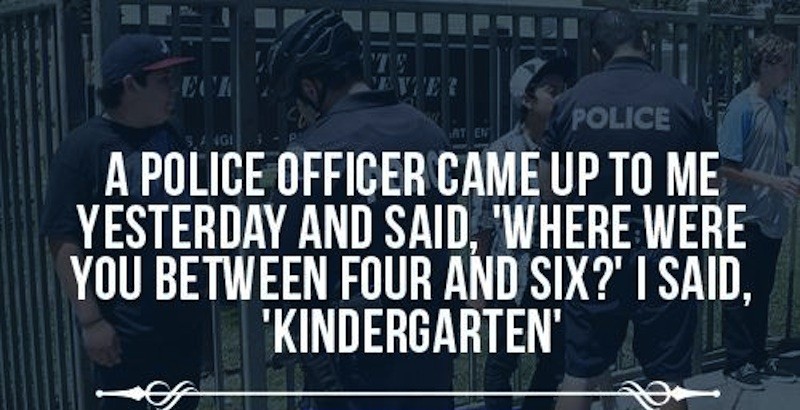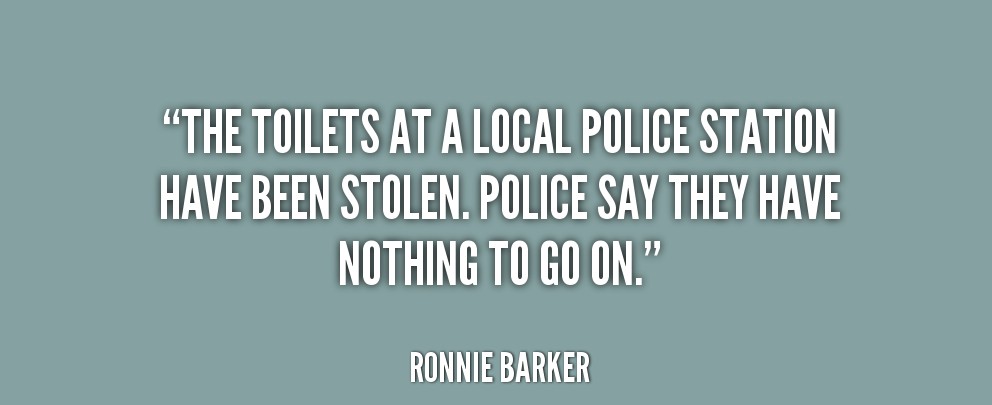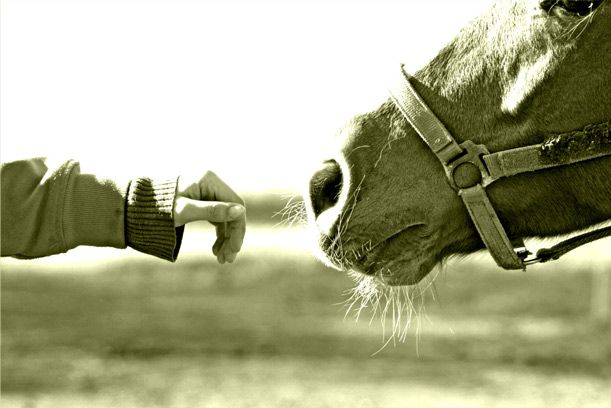Robert Drewe, a male individual, not currently of interest to the police, examines some of the more tortured expressions he’s heard over the years…
You might recall our interest in such language curiosities as menu-speak, real-estate-speak, and menswear-speak. Police featuring prominently on the TV news lately reminded me of the most bizarre speech pattern of all: cop-talk.
In younger days on newspaper police rounds I spoke to cops on the job and sometimes in the pub, and they spoke like normal Australians (more vigorously and colloquially, in fact). No cop ever said to me: “Whilst presently in attendance in this hotel bar I observe that my glass is empty and I ascertain that it’s your round.”
But in Police Court, or on television, they talked like aliens. This also seemed true of British and American police. I wondered whether police academies trained them to speak in a convoluted way.
The argument that they spoke like this so they couldn’t be legally misinterpreted seemed like nonsense when a “man” became a “male person” or a “male individual”, “while” became “whilst” and “car” became “vehicle”.
An individual in charge of a vehicle, as police prefer to describe him, is less – not more – precise than a man driving a car. (So is the subject maybe driving a bus? A truck? Perhaps a bulldozer?)
I respect what police have to do and endure on a daily basis. But it can’t make their lives any easier to have to learn and speak another tortuous language. Is the gobbledegook designed to confuse the public? To sound important? To preserve a barrier between them and us? To get themselves off the hook if things turn pear-shaped?
A classic court example: Lawyer – “What happened then, officer?”
Copper: “I attempted to apply an escort hold to the individual but I noted resistive tension in his arm so I applied pain compliance instead. The individual actively resisted so I administered a focused knee strike to the lower abdominal area, and decentralized the individual.”
Lawyer: “In other words, you tried to grab my client’s arm, and when he pulled away, you twisted his wrist, and then kicked him in the groin and threw him down on the pavement.”
Copper: “Well, I wouldn’t put it in quite those words.”
You might have noticed that cops don’t get into their cars — they enter police vehicles. They don’t get out of a car either – they exit the vehicle. They don’t go anywhere (nor does anyone else) – they proceed. They don’t go to a particular place – they proceed to its vicinity.
They don’t watch or look – they surveille. They never see anything – they observe it. No one ever tells them anything either – they’re advised. A person doesn’t say something – he indicates. Nor does he tell them his name – he identifies himself. They don’t listen to a telephone conversation – they monitor it.
A brief glossary of common police-speak:
Male person (Man).
Gentleman (Man. Oddly enough, he mightn’t be at all gentlemanly. He might even be a serial killer.)
Female person (Woman).
Lady (Woman. She needn’t be ladylike though. She might actually be rude and slovenly).
Juvenile person (Child, teenager).
Youth (Troublemaker).
Individual (Suspected person).
Official firearm or sidearm (Gun)
Vehicle (Car).
Myself (I, me).
Whilst (While).
In attendance (There).
In possession of (Has).
I ascertained the location of the residence (I found the house).
Person of interest (The one we’re hoping to arrest).
Police would like to speak with him (We really want to arrest him).
Incident (Anything from disorderly conduct to mass murder).
Attempted to avoid police (Ha! Didn’t).
Police officers apprehended the alleged perpetrator (We caught him).
Is helping police with their inquiries (We’ve dead-set got the bastard).
The individual was observed by myself fleeing on foot from the location (I saw him running away).
Whilst in attendance I ascertained that a firearm had been discharged into the head of a male person whilst lying in bed by an individual in his immediate vicinity (I saw the man had been shot in the head in his bed).
The male person was armed and dangerous and reported to be in possession of an improvised garden implement (The man had a spade).
My absolute favourite example of international cop-speak, however, comes from a recent incident at Dallas airport, when I saw a traveller try to pat a sniffer dog.
Police officer, tersely: “Do not touch the Federal agent!”
Robert Drewe’s most recent books The Local Wildlife and Swimming to the Moon are on sale here: penguin.com.au







